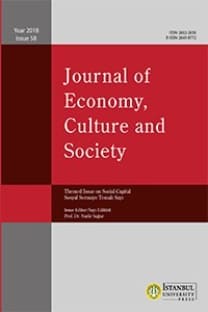Yaşanmış Deneyimler ve Öznellikler Çerçevesinde Tabakalaşmayı Okumak
Öznel toplumsal hareketlilik, yönetimsel şirket modeli, özneleşme, beyaz yaka örgütlenmeleri
Reading Stratification in the Framework of Subjectivities and Lived Experiences
Subjective social mobility, managerial company model, subjectification, white-collar organizations,
___
- Attias-Donfut, C., & François-Charles, W. (2001). La dimension subjective de la mobilité sociale. Population, 56(6), 919—958. https://doi.org/10.2307/1534747
- Bora, T. (2010). Boşuna mı okuduk?: Türkiye’de beyazyakalı İşsizliği İstanbul: Iletişim.
- Bouilloud, J.-P. (2012). Entre l’enclume et le marteau: Les cadres pris au piège Paris: Seuil.
- Bourdieu, P. (1979). La Distinction: Critique sociale du jugement Paris: Minuit.
- Çarkoğlu, A., & Kalaycıoğlu, E. (2009). Türkiye’de toplumsal eşitsizlik 2009. Istanbul: Sabancı Üniversitesi.
- de Gaulejac, V. (2005). La société malade de la gestion. Paris: Seuil. .
- de Gaulejac, V., & Hanique, F. (2015). Le Capitalisme paradoxant. Un système qui rend fou Paris: Seuil.
- Dejours, C. (1998). Souffrance en France. Paris: Seuil.
- Dubet, F. (2013). Injustices: L’expérience des inégalités au travail. Paris: Seuil.
- Durand, J.-P. (2004). La chaîne invisible: Travailler aujourd’hui: Flux tendu et servitude volontaire. Paris: Seuil.
- Duru-Bellat, M., & Kieffer, A. (2006). Les deux faces – objective/subjective – de la mobilité sociale. Sociologie Du Travail, 48(4), 455—473.
- Erikson, R., & Goldthorpe, J. H. (1992). The constant flux: A study of class mobility in industrial societies. New York: Clarendon Press.
- Günay, D., & Günay, A. (2011). 1933’ten Günümüze Türk yükseköğretiminde niceliksel gelişmeler. Yükseköğretim ve Bilim Dergisi, (1), 1—22.
- Kaya, Y. (2008). Proletarianization with polarization: Industrialization, globalization, and social class in Turkey, 1980–2005. Research in Social Stratification and Mobility, 26(2), 161—181. https://doi.org/10.1016/j.rssm.2007.11.003
- Kocyba, H. (2007). Reconnaissance, subjectivisation, singularité. Travailler, (18), 103—118. https://doi.org/10.3917/trav.018.0103
- Lallement, M. (2007). Le travail. Une sociologie contemporaine. Paris: Gallimard.
- Linhart, D. (1994). La modernisation des entreprises. Paris: La Découverte..
- Linhart, D. (2008). Que fait le travail aux salariés? Que font les salariés du travail? Point de vue sociologique sur la subjectivité au travail. D. Linhart (Ed.), Pourquoi travaillons-nous? kitabı içinde Toulouse: Erès, ss.7—33
- Mercure, D. (2013). Le nouveau modèle de pouvoir et de domination au travail dans le mode de production postfordiste. SociologieS . Erişim adresi: http://journals.openedition.org/sociologies/4227
- Mills, C. W. (1951). White Collar: The American Middle Classes. New York: Oxford University Press
- Nurol, B. (2014). Bilgi toplumunda zanaat fikri: Beyaz yakalı emeğin değersizleşmesi. Sosyoloji Araştırmaları Dergisi, 17(1), 76—129. https://doi.org/10.18490/sad.53739
- Özatalay, C. (2014). Türkiye’de ücretliler toplumunun başkalaşımları. Toplum ve Bilim, (129), 130—151.
- Paillé, P., & Mucchielli, A. (2012). L’herméneutique au coeur de l’analyse qualitative. L’analyse qualitative en sciences sociales. Paris: Armand Colin. , 103—116.
- Passeron, J.-C. (1982). L’inflation des diplômes: Remarques sur l’usage de quelques concepts analogiques en sociologie. Revue française de sociologie, 23(4), 551—584. https://doi.org/10.2307/3321659
- Sağlam, M. (1994). Yükseköğretimde gelişmeler. Ankara: Yükseköğretim Kurumu Başlanlığı.
- Sennett, R. (2000). Le travail sans qualités. Paris: Albin Michel.
- Sennett, R. (2006). The Culture of the New Capitalism. New Haven: Yale University Press.
- Spurk, J. (1997). Une critique de la sociologie de l’entreprise: L’hétéronomie productive de l’entreprise. Paris: L’Harmattan.
- Taylor, F. W. (1911). The Principles of Scientific Management. New York, London: Harper & Brothers.
- Weber, M. (1995). Economie et societe: 2; l’organisation et les puissances de la societe dans leur rapport avec l’economie. Paris: Plon.
- Yücesan Özdemir, G. (2014). İnatçı köstebek İstanbul: Yordam
- ISSN: 2602-2656
- Yayın Aralığı: Yılda 2 Sayı
- Başlangıç: 1960
- Yayıncı: İstanbul Üniversitesi Yayınevi
Meslek Sosyolojisinde Teorik Yaklaşımlar
Çevrimiçi Dönüşümün Mesleki Tezahürü: E-Spor Faaliyetleriyle “Dijital Oyuncular Kuşağı”
Burcu KAYA ERDEM, Rukiye CİVAN KEMİKSİZ
Sosyo-Ekonomik Değişmeyle Başa Çıkmak: Küçük Esnafın Taktikleri
Türkiye’de Mesleki İtibar: Dönüşen Çalışma Hayatı ve Mesleklerin Sosyal Konumu
Türkiye’de Toplumsal Tabakalaşma ve Hareketliliğin Meslekler Üzerinden Ölçümü
Elazığ’da Yaşayan Çingenelerin Değişen/ Dönüşen Meslekleri Üzerine Nitel Bir Araştırma
Standart Sınavlar ve Dönüşen Öğretmen Kimliği
Yunus Emre ÖMÜR, Bünyamin BAVLI
Ustalık ve Teknoloji Eklemlenmesi: Beceri, Deneyim, Kesinlik
Ölü Beden Yönetiminde Dini Mesleki Bir Form: Gassal
Kadın Akademisyenlerin Kariyer Kimliği İnşası: Araştırma Yapmak İsteyen Anne Öğretim Üyesi
